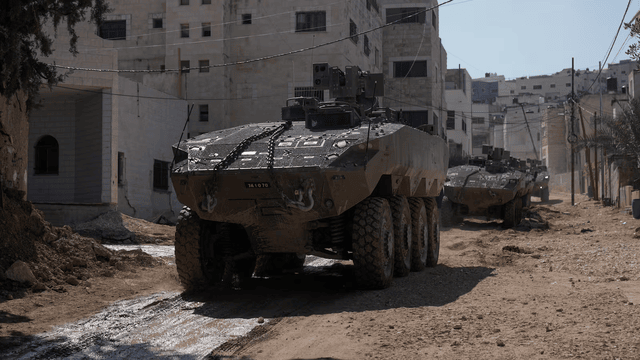
Israeli military vehicles were spotted in Jenin, a city in the West Bank, during an operation on Tuesday, March 11, 2025. AP
Canada is calling in Israel’s ambassador after the Israeli military fired warning shots near a group of diplomats touring the West Bank city of Jenin on Wednesday. Prime Minister Mark Carney called the event “totally unacceptable” and said Canada expects a full explanation.
The Israeli military said it “regrets the inconvenience caused” by the shots. Foreign Affairs Minister Anita Anand confirmed that four Canadians were part of the diplomatic group and said she is “relieved” they are safe. She added that she expects a thorough investigation and that those responsible must be held accountable.
Anand also said she has asked officials to summon the Israeli ambassador to express Canada’s serious concerns about the incident.
What Happened at Jenin
Videos show diplomats near a large yellow gate when gunshots rang out. The group quickly moved away, and two soldiers appeared pointing guns at them. The Israeli military said the group left their approved path, which caused soldiers to fire warning shots to get them to leave the restricted area. No one was hurt.
Other countries also expressed concern. France’s foreign minister said the incident is unacceptable and called in Israel’s ambassador. Italy’s foreign minister also summoned Israel’s envoy to explain.
Israel’s army said it is investigating the matter and will update the diplomats involved.
Expert View on Diplomatic Safety
Former Canadian diplomat Colin Robertson said diplomats visiting conflict zones do face risks. He explained that such incidents are not always intentional but are part of the “warlike” conditions in places like the West Bank. He added that there have been past cases where peace monitors were harmed in conflict zones.
Wider Context: Diplomatic Pressure on Israel
This event comes amid increased international pressure on Israel due to its military actions in Gaza. Earlier this week, Carney joined leaders from Britain and France in threatening “targeted sanctions” against Israel because of its military offensive and limited food aid to Gaza. They also opposed plans to expand Israeli settlements in the West Bank.
Carney said Canada informed the U.S. vice-president in advance about their joint statement but described the conversation as “one-way.” He emphasized that Israel must ensure enough humanitarian aid reaches Gaza.
The U.K. has already imposed sanctions on some individuals and groups linked to violence in the West Bank. While it paused trade talks with Israel, trade still continues.
Robertson expects Canada will issue more statements alongside European allies. Carney stressed that Canada now needs to act more independently, especially as relations with the U.S. have grown tense over trade and political issues.
Canada has previously sanctioned people involved in extremist settler violence in the West Bank, with the latest sanctions announced last September.
Political Reactions
When asked if the U.S. president planned to discuss the situation with Israeli Prime Minister Netanyahu, he did not respond. Robertson said it is likely the U.S. knew about the joint statement before it was made public. He predicts Canada will follow a more practical and independent foreign policy approach, rather than always following the U.S.
Israeli Prime Minister Netanyahu criticized the leaders of Canada, France, and the U.K. for their joint statement, accusing them of encouraging attacks on Israel.
Meanwhile, Hamas, labeled a terrorist group by Canada, welcomed the statement, calling it a “significant step.”















